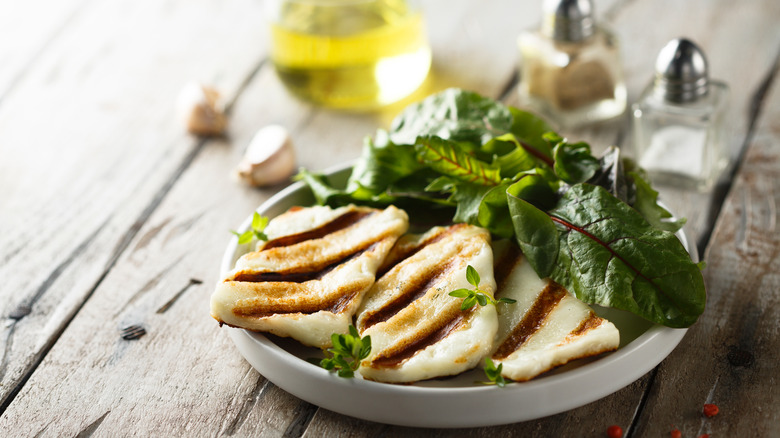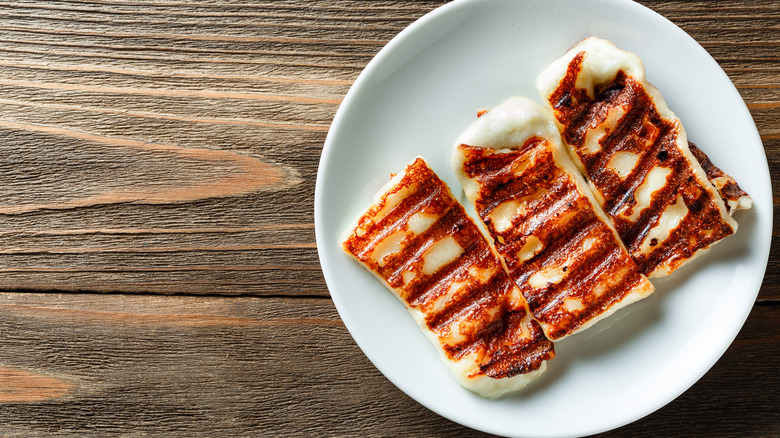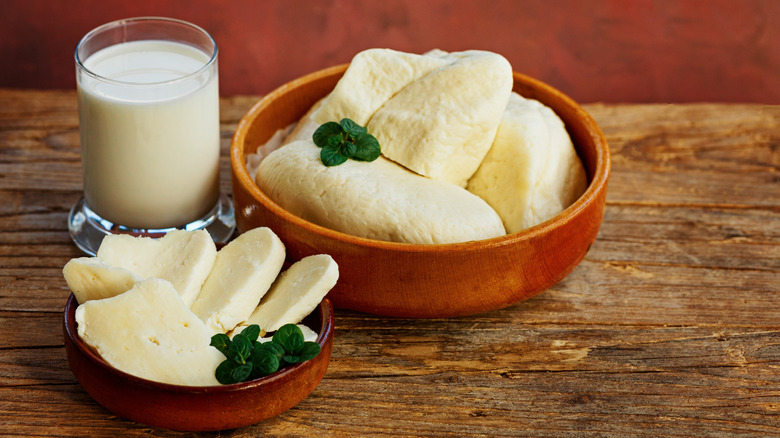The Real Reason Halloumi Cheese Can Be So Expensive
We're sure you've heard of a grilled cheese, but have you heard of grilling cheese? If you've ever come across halloumi, you'll know it's just that — a cheese made to be grilled.
Halloumi is a "creamy, chewy, mild cheese" according to Oola, with the rare ability, when put in contact with heat, not to become the ooey, gooey mess you may expect when attempting to pan sear or grill a slice of cheese. Instead, halloumi holds its own and develops a delicious char when cooked, says Oola, a reaction made possible by very little acid in the cheese's production process, leaving it with a very high melting point.
The semi-hard, slightly briny white cheese is a staple on plates in Cyprus, where it originates, according to Oola. But the cheese is also having a heyday stateside. While halloumi may be sure to please your palate, your wallet may not be so satisfied.
A short history of high prices for halloumi
This hearty, grillable dairy product does not come cheap. Not only is the cheese spendy now, but it also has a history of high prices. Food52 notes that the going rate for halloumi in 2015 ranged from $16 to $20 a pound. Why so expensive, you ask? Well, in a 2015 interview with Food52, Walshe Birney, the buying manager for Murray's Cheese in New York City, credited the then-cost to Cyprus' geography, saying a lack of infrastructure to export the product results in higher prices.
More specifically, according to Food52, the area of Cyprus went through an "economic downturn," resulting in fewer funds to invest in halloumi production and no opportunities for the industry to expand, even as the demand for the cheese rose. That downturn, according to World Finance, stabilized by 2019. But a recent registration of the cheese and regulations surrounding its production are potentially behind the current high prices.
Why halloumi is still expensive today
In 2021, the price of halloumi is still high. At Whole Foods, halloumi may cost upwards of $16.99 per pound, according to the store's website, although prices vary by region. According to The Telegraph, this may be due to a new registration of halloumi cheese. The cheese, says The Telegraph, was recently granted "special Protected Designation of Origin (PDO) status." This means that for a cheese to carry the title halloumi, it must be made in Cyprus and follow certain production regulations.
While some are happy about this new regulation as it protects the lucrative Cyprus cheese industry from competitors creating their version of the cheese in other regions, The Telegraph notes that some farmers and halloumi makers in Cyprus say that the stipulations of creating officially recognized halloumi will result in smaller production sizes. In fact, Giorgos Petrou, the president of the Cyprus Dairy Producers Association, told The Telegraph the regulation would deeply cut imports because less of the cheese would be produced.
One of those regulations, says Telegraph, is the cheese must be made from over 51 percent sheep or goats milk — both more expensive and scarce than cow's milk, notes Oola. Like many products with smaller production sizes, the high demand of halloumi is then partly responsible for how expensive it is, says Oola.
If you cross paths with halloumi in the grocery store aisle, don't let the price deter you. Some things — like delicious, small production imported cheese — are just worth it.


